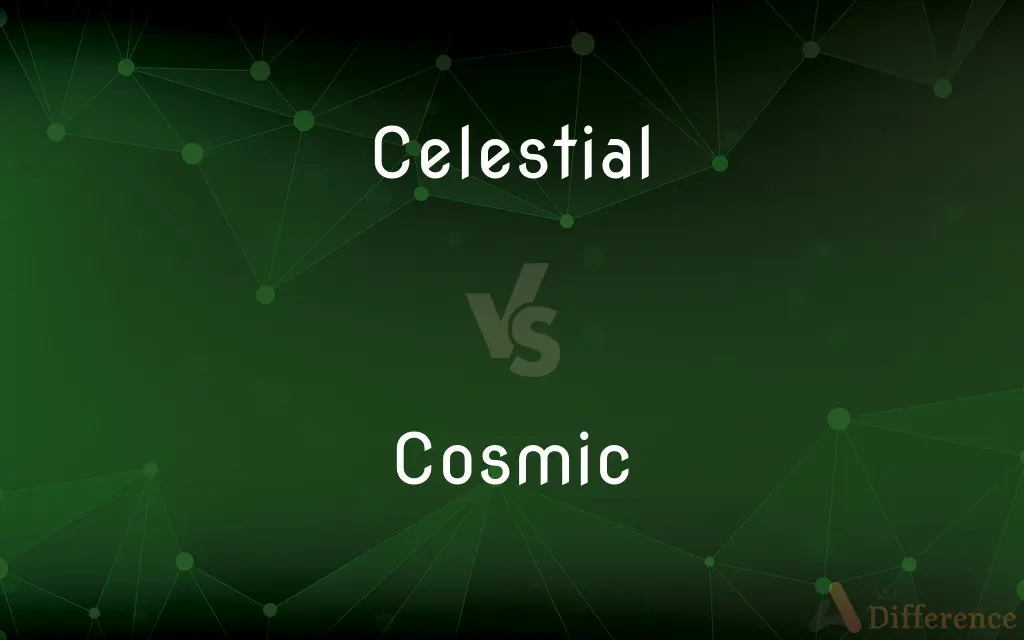Celestial vs. Cosmic — What's the Difference?
By Urooj Arif & Fiza Rafique — Updated on April 29, 2024
Celestial refers to objects or phenomena located in the sky or outer space, such as stars and planets, while cosmic relates to the universe as a whole, often emphasizing vastness or universality.

Difference Between Celestial and Cosmic
Table of Contents
ADVERTISEMENT
Key Differences
Celestial is used specifically to describe objects and phenomena that are observable in the sky or space, such as celestial bodies (stars, planets, comets) and celestial events (eclipses, meteor showers). On the other hand, cosmic pertains to the universe at large, covering not only celestial bodies and events but also concepts like cosmic rays and cosmic time, which extend beyond mere observational astronomy.
Celestial navigation involves using positions of stars and other heavenly bodies to determine one's location on Earth, while cosmic navigation (though a less common term) would theoretically involve navigating across space using universal coordinates or phenomena like cosmic microwave background radiation.
In literature, celestial imagery is often used to create a sense of awe or to highlight beauty or transcendence associated with the sky or heavens, whereas cosmic imagery can convey vastness, mystery, or philosophical concepts about the universe or existence.
Artistic representations may depict celestial themes using recognizable constellations, planets, and celestial events, aiming to capture the beauty of the night sky or specific astronomical phenomena. Cosmic art, in contrast, might focus on abstract concepts, vast galactic structures, or speculative views of space, emphasizing scale and the unknown.
In religious or spiritual contexts, celestial is frequently associated with heavenly realms, gods, or afterlife places thought to exist above the Earth. Cosmic, however, often relates to ideas about the origin of the universe, cosmic destiny, or the connection between the universe and spiritual laws.
ADVERTISEMENT
Comparison Chart
Definition
Relating to the sky or outer space
Relating to the universe as a whole
Scope
Specific to observable sky objects
Encompassing overall cosmic phenomena
Usage in navigation
Used in traditional sky navigation
Theoretical use in space navigation
Literary use
Creates awe, related to beauty
Conveys vastness, mystery
Artistic themes
Constellations, planets
Abstract, galactic structures
Compare with Definitions
Celestial
Extremely delightful or beautiful, heavenly.
She described her vacation in the Maldives as a celestial experience.
Cosmic
Pertaining to the general or universal laws and phenomena.
He believes in a cosmic order that dictates the destiny of mankind.
Celestial
Positioned in or relating to the space outside the Earth's atmosphere.
Satellites are celestial bodies man-made and launched for various purposes.
Cosmic
Pertaining to the cosmos, the universe seen as a well-ordered whole.
Cosmic theories often attempt to explain the origins of the universe.
Celestial
Used in astronomy to describe objects in the visible universe.
The study of celestial mechanics involves the motion of bodies like planets and stars.
Cosmic
Involving or relating to cosmic rays or cosmic radiation.
Cosmic radiation poses a significant challenge for astronauts.
Celestial
Of or relating to heaven or divinity.
Angels are often depicted as celestial beings.
Cosmic
Used in popular culture to describe large-scale or impactful events or features.
The movie had a cosmic battle scene that became iconic.
Celestial
Pertaining to the sky or visible heaven.
The celestial panorama on a clear night is breathtaking.
Cosmic
Immeasurably extended; vast.
The cosmic expanse of the desert at night can feel overwhelming.
Celestial
Positioned in or relating to the sky, or outer space as observed in astronomy
A celestial body
Cosmic
Of or relating to the regions of the universe distinct from Earth.
Celestial
Of or relating to the sky or physical universe as understood in astronomy
Planets are celestial bodies.
Cosmic
Infinitely or inconceivably extended; vast
"a coming together of heads of government to take up the cosmic business of nations" (Meg Greenfield).
Celestial
Of or relating to heaven; divine
Celestial beings.
Cosmic
Of or from or pertaining to the cosmos or universe.
Celestial
Supremely good; sublime
Celestial happiness.
Cosmic
Characteristic of the cosmos or universe; inconceivably great; vast.
Cosmic speed
Celestial
Celestial Of or relating to the Chinese people or to the former Chinese Empire.
Cosmic
Of or relating to abstract spiritual or metaphysical ideas.
Celestial
A heavenly being; a god or angel.
Cosmic
Rising or setting with the sun; not acronycal.
Celestial
Syn of heavenly: of or related to Heaven and the divine.
Cosmic
Pertaining to the universe, and having special reference to universal law or order, or to the one grand harmonious system of things; hence; harmonious; orderly.
Celestial
Relating to the sky or outer space, regarded as the realm of the sun, moon, planets, and stars.
Cosmic
Pertaining to the solar system as a whole, and not to the earth alone.
Celestial
(Mormonism) Of or pertaining to the highest degree of glory.
Cosmic
Characteristic of the cosmos or universe; inconceivably great; vast; as, cosmic speed.
Celestial
Extremely good, pleasant, or blissful; heavenly.
Cosmic
Rising or setting with the sun; - the opposite of acronycal.
Celestial
An inhabitant of heaven.
Cosmic
Of unsurpassed size, extent, or significance; vast; as, of cosmic proportions; of cosmic importance.
Celestial
A native of China.
Cosmic
Of or from or pertaining to or characteristic of the cosmos or universe;
Cosmic laws
Cosmic catastrophe
Cosmic rays
Celestial
By extension, an East Asian person.
Cosmic
Inconceivably extended in space or time
Celestial
Belonging to the aërial regions, or visible heavens.
Celestial
Of or pertaining to the spiritual heaven; heavenly; divine.
Celestial
Of, pertaining to, or characteristic of, the Chinese, or Celestial, Empire, of the Chinese people.
Celestial
An inhabitant of heaven.
Celestial
A native of China; a Chinaman; a Chinese.
Celestial
Of or relating to the sky;
Celestial map
A heavenly body
Celestial
Relating to or inhabiting a divine heaven;
Celestial beings
Heavenly hosts
Celestial
Of heaven or the spirit;
Celestial peace
Ethereal melodies
The supernal happiness of a quiet death
Common Curiosities
How is cosmic different from celestial in scientific context?
Cosmic encompasses not just observable phenomena like celestial bodies but also abstract universal elements such as cosmic time and cosmic rays.
Can celestial be used to describe events on Earth?
Celestial generally refers to phenomena occurring in the sky or space, not on Earth.
How do celestial maps work?
Celestial maps chart the positions of stars, planets, and other celestial bodies as seen from Earth.
What does celestial mean in astronomy?
In astronomy, celestial refers to anything located in or pertaining to the outer space visible from Earth, such as stars, planets, and galaxies.
What are cosmic rays?
Cosmic rays are high-energy particles from outer space that strike the Earth's atmosphere.
Does cosmic have philosophical implications?
Yes, cosmic often involves philosophical discussions about the universe's nature, structure, and the place of humanity within it.
What is a celestial sphere?
The celestial sphere is an imaginary sphere of arbitrarily large radius, centered on the observer, onto which all celestial bodies are projected.
What does cosmic radiation consist of?
Cosmic radiation primarily consists of high-energy particles from space that can have significant effects on electronic devices and human health.
What is a cosmic perspective?
A cosmic perspective refers to viewing issues or concepts from the standpoint of their impact or relation to the universe as a whole.
Is the term celestial related to religion?
Yes, celestial is often used in religious contexts to describe heavenly realms or beings.
How do artists depict cosmic themes?
Artists depict cosmic themes through abstract representations of space, often highlighting the enormity and mystery of the universe.
Can cosmic be used in everyday language?
Yes, cosmic can be used metaphorically to describe anything vast or universally significant.
What role do celestial coordinates play in astronomy?
Celestial coordinates are used in astronomy to pinpoint the positions of celestial bodies in the sky, aiding in navigation and observation.
How is cosmic horror distinct in literature?
Cosmic horror in literature explores the fear of the unknown and the insignificance of humanity in the vast cosmos, often leaving protagonists facing incomprehensible universal forces.
Are celestial events predictable?
Many celestial events, like eclipses and cometary appearances, can be predicted with high accuracy due to their cyclical nature.
Share Your Discovery

Previous Comparison
Invoice vs. Facture
Next Comparison
Staff vs. WandAuthor Spotlight
Written by
Urooj ArifUrooj is a skilled content writer at Ask Difference, known for her exceptional ability to simplify complex topics into engaging and informative content. With a passion for research and a flair for clear, concise writing, she consistently delivers articles that resonate with our diverse audience.
Co-written by
Fiza RafiqueFiza Rafique is a skilled content writer at AskDifference.com, where she meticulously refines and enhances written pieces. Drawing from her vast editorial expertise, Fiza ensures clarity, accuracy, and precision in every article. Passionate about language, she continually seeks to elevate the quality of content for readers worldwide.
















































